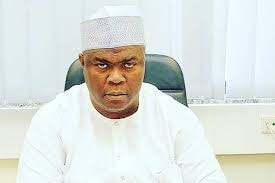A former spokesperson to ex-Vice President Namadi Sambo, Umar Sani, has taken a swipe at billionaire businessman Femi Otedola, accusing him of rewriting history and playing to the gallery over Nigeria’s long-standing fuel subsidy controversy.
Sani was reacting to Otedola’s recent remarks on the fuel subsidy regime, in which the business mogul claimed that over N2 trillion was siphoned through fraudulent subsidy payments during the administration of former President Goodluck Jonathan.
In a post shared via his X (formerly Twitter) page, Sani described Otedola’s comments as “hypocritical, selective, and a convenient rewriting of history.” He said the subsidy system had existed for decades and was not a creation of the Jonathan government alone.
Sani reminded Otedola that the fuel subsidy regime predates Jonathan and was already deeply rooted in Nigeria’s petroleum pricing structure long before Jonathan came to power.
“The subsidy regime started under Obasanjo, continued under Yar’Adua, was sustained during Jonathan’s tenure, and remained under Buhari, even with greater secrecy,” he said.
He added that it was unfair for Otedola to single out Jonathan’s administration for blame when successive governments had operated under the same model.
Umar Sani didn’t stop there. He pointed out that Otedola’s company, Zenon Petroleum and Gas Ltd, was a major beneficiary of the same fuel subsidy regime the businessman now criticises.
According to him, Zenon once controlled up to 90 percent of diesel imports into Nigeria and was deeply embedded in the subsidy framework.
“To now turn around and condemn a system he profited from is not only dishonest but a form of image-laundering,” Sani wrote.
Sani also brought back to public memory the Farouk Lawan bribery scandal, in which Otedola admitted to giving marked money to the then-chairman of the House ad-hoc committee investigating subsidy fraud.
While Otedola later claimed it was part of a sting operation, many Nigerians still view the incident as part of the wider rot in the subsidy system.
“Otedola himself was spotlighted during the forensic probe led by Aigboje Aig-Imoukhuede and the House of Representatives committee chaired by Farouk Lawan,” Sani said.
He insisted that Otedola’s role during that period disqualifies him from taking the moral high ground now.
Sani urged Otedola to support a full, independent investigation into the subsidy payments across all administrations from Obasanjo to Buhari rather than focusing on one era.
“Until then, his accusations amount to nothing more than the pot calling the kettle black,” he said.
“If Otedola truly wants transparency, he should back a thorough audit of the subsidy regime, including the period when his company was a major player,” Sani added.
He stressed that Nigerians deserve truth, full disclosure, and historical accuracy, not “curated narratives” designed to protect reputations or shift blame.
Femi Otedola had recently criticized members of the Depot and Petroleum Products Marketers Association of Nigeria (DAPPMAN), a group he claimed to have founded, for sustaining what he called a corrupt system built on subsidy fraud and outdated infrastructure.
He accused marketers of manipulating the system to claim billions of naira in false subsidy payments, especially during the Jonathan administration.
Fuel subsidy has been one of Nigeria’s most controversial policies. While intended to make petrol affordable for Nigerians, it has become a drain on public funds, with billions lost to fraud and inflated claims.
Successive governments have struggled to either reform or remove the subsidy due to public backlash and political pressure.
President Bola Tinubu, upon assuming office in May 2023, announced the end of the subsidy regime, calling it unsustainable. However, questions remain about how funds saved from subsidy removal are being used and whether true transparency has been achieved.

